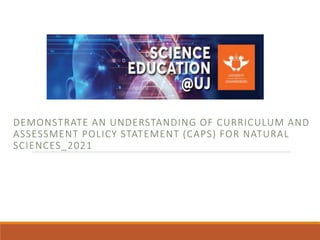
Lecture 2.pptx
- 1. DEMONSTRATE AN UNDERSTANDING OF CURRICULUM AND ASSESSMENT POLICY STATEMENT (CAPS) FOR NATURAL SCIENCES_2021
- 2. LEARNING UNIT 1: Curriculum development and the fundamentals of the NCS and CAPS
- 4. Traditional curriculum Revised curriculum (NCS; CAPS) Passive learners Active learners Exam-driven Learners are assessed on an ongoing basis: continuous assessment (CASS) Rote-learning Critical thinking, reasoning, reflection and action Syllabus is content-based and broken down into subjects An integration of knowledge; learning is relevant and connected to real-life situations Textbook bound and teacher centred Learner-centred; the teacher is the facilitator; the teacher often uses group work and teamwork to consolidate the new approach Syllabus seen as rigid and non-negotiable Learning programmes seen as guides that allow teachers to be innovative and creative in designing programmes Teachers responsible for learning; motivation dependent on the personality of the teacher Learners take responsibility for their learning; learners are motivated by constant feedback and affirmation of their worth Emphasis on what the teacher hopes to achieve Emphasis on outcomes (what the learner becomes and understands)
- 6. What is a curriculum ? “The planned and guided learning experiences and intended learning outcomes, formulated through the systematic reconstruction of knowledge and experiences, under the auspices of the school, for the learners’ continuous and willful growth in personal social competence.” Source: Tanner (1980, p.13)
- 7. When designing a new curriculum what do you need to consider?
- 8. The Tyler Model of Curriculum Design The nature & structure of knowledge The needs of the society The needs of the learner
- 9. Selection of Subject Matter Criteria: Relevance, importance, priority Scope: Amount, depth of coverage, concentration Sequence: Hierarchy & progression of complexity or difficulty
- 12. Needs of the Learner *Cognitive development *Linguistic development *Psycho-social development *Moral/affective development *Vocational focus
- 13. The Needs of Society Literacy Vocational skills Social order & morality Interpersonal skills Transmission of values & culture Creativity & innovation
- 14. What are the principles which underlie the new curriculum ? Principles Implications Social transformation Responsible decision-making High knowledge and high skills Specifies the minimum standard Integration and applied competence Integration within and across subjects Progression Assessment standards show and increased level expected performance Human rights, inclusivity, environmental and social justice Create inclusive environment Valuing indigenous knowledge systems Indigenous knowledge of local community must be recognized
- 15. SPECIFIC AIMS (CAPS) The specific aims provide guidelines on how to prepare learners to meet the challenges of society and they feature during teaching, learning and assessment.
- 16. SPECIFIC AIM 1 ‘Doing science’ learners should be able to carry out investigations, analyse problems and use practical processes and skills in evaluating solutions.
- 17. Example. Attitudes and values underpin this ability. Respect for living things is an example – learners should not damage plants; if they examine small animals they should care for them and release them in the place where they found them.
- 18. Cont. (Diversity of plants) Growing plants such as beans or maize seeds to observe the stages in the life cycle. Measure the height of the plant as it grows. Record observations in diagrams, tables and graphs
- 19. SPECIFIC AIM 2 specific aim 2: ‘Knowing the subject content and making connections’ learners should have a grasp of scientific, technological and environmental knowledge and be able to apply it in new contexts.
- 20. Example When learners do an activity, questions and discussion must follow and relate to previously acquired knowledge and experience, and connections must be made.
- 21. Cont. (Physical properties of materials) Reading and writing about how a material such as a metal or plastic or fuel is produced and its impact on the environment.
- 22. Useful and ‘wasted’ energy Identifying the input energy, useful output energy and ‘wasted energy’ when systems are operated. [Use real examples or pictures of systems such as electric drill, electric iron, kettle, food mixer, candle, engine, paraffin lamp].
- 23. SPECIFIC AIM 3 Learners should understand the uses of natural sciences and indigenous knowledge in society and the environment. specific aim 3: ‘understanding the uses of science ’
- 24. Example Science learnt at school should produce learners who understand that school science can be relevant to everyday life. Issues such as improving water quality, growing food without damaging the land and building energy-efficient houses are examples of applications. An appreciation of the history of scientific discoveries, and their relationship to indigenous knowledge and different world views, enriches our understanding of the connections between Science and Society.
- 26. Calabash /Iselwa
- 27. Traditional beer
- 29. Learning outcomes (NCS) LO1: Practical scientific inquiry and problem-solving skills LO2: Constructing and applying scientific knowledge LO3: The nature of science and its relationships to technology, society and the environment
- 30. 4 KNOWLEDGE AREAS LIFE AND LIVING MATTER AND MATERIALS ENERGY AND CHANGE PLANET EARTH AND BEYOND
- 31. PRACTICAL WORK Practical work must be integrated with theory to strengthen the concepts being taught. These may take the form of simple practical demonstrations or even an experiment or practical investigation.
- 32. skills Accessing and recalling information – being able to use a variety of sources to acquire information, and to remember relevant facts and key ideas, and to build a conceptual framework Observing – noting in detail objects, organisms and events Comparing – noting similarities and differences between things measuring – using measuring instruments such as rulers, thermometers, clocks and syringes (for volume) Sorting and classifying – applying criteria in order to sort items into a table, mind-map, key, list or other format Identifying problems and issues – being able to articulate the needs and wants of people in society Raising questions – being able to think of, and articulate relevant questions about problems, issues, and natural phenomena Predicting – stating, before an investigation, what you think the results will be for that particular investigation
- 33. Refer to the CAPS document Cognitive and Process Skills -
